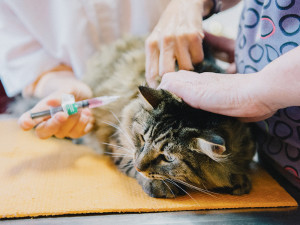Does My Pet Need a Passport?
Don’t start packing those treats just yet...
Thinking of jetting off to Europe with your four-legged friend this summer? Be prepared for a bit of paperwork and some extra planning. The days of the convenient EU pet passport are behind us, and now pet parents must navigate a new process involving Animal Health Certificates (AHCs) to be able to travel abroad with their beloved companions.
What has replaced the EU Pet Passport?
With the UK’s departure from the EU, the EU pet passport is now a thing of the past for British pet parents. Since 1 January 2021, Great Britain has bid adieu to the EU’s pet passport scheme, and instead, every pet must be armed with an Animal Health Certificate (AHC) for European adventures.
Northern Ireland, however, has retained its membership in the EU pet travel scheme. So, if you’re lucky enough to possess a pet passport issued in Northern Ireland, you might catch a break. But it’s always best to double-check with your vet before you hit the road... or sky. However, because of this, pet parents will need an AHC to travel to Northern Ireland from England, Wales or Scotland. Despite them being part of the UK. Brexit means… Brexit?
What is an Animal Health Certificate (AHC)?
The centrepiece of your pet’s travel documents is the Animal Health Certificate (AHC). These 10–14-page documents, packed with all the vital info about your pet – from microchip details to rabies vaccination records – are essential for entry into any European Union countryopens in new tab and Northern Ireland.
But (and that’s a big but…) an AHC is a one-trip wonder; each journey calls for a fresh certificate. You can add up to five pets on an AHCopens in new tab, but with them costing between £100–£300 per certificate, it can still be a huge hidden expense for pet parents.
What do you need to do to obtain an Animal Health Certificate (AHC)?
Getting your paws on an AHC involves a visit to your vet, where they will confirm that your pet is microchipped, vaccinated against rabies and other necessary treatments have been documented.
The clock starts ticking from the moment the certificate is issued – it’s only valid for 10 days before your travel date and remains valid for four months for onward travel within the EU and return to Great Britain, so planning ahead is key, especially during busy travel seasons.
How much does an Animal Health Certificate (AHC) cost?
So, how much will all of this set you back? Firstly, you’ll need a new AHC for each trip you make, which can cost between £100–£300 per certificate. This should include the vet consultation fee, plus reviewing and finalising all your pet’s documents.
Besides the cost of the AHC, you’ll need to budget for microchipping (if they’re not already chipped), rabies vaccinations and any other required treatments (such as tapeworm treatments, and additional vaccinations or medications), which will incur further charges. Prices vary, but expect to shell out anywhere from £10–£80 for each of these.
According to the Royal Veterinary Collegeopens in new tab, “A microchip is £16.28 and will only need to be implanted once. A rabies vaccination costs £50.40 – this will need to be repeated every three years to allow continual travel under the Pet Travel Scheme.”
What are other considerations before and after travelling to and within Europe with your pet?
Let’s talk logistics. Besides the AHC, there are additional requirements for pets travelling to the EU:
Microchipping: every pet must be microchipped for identification purposes (currently a legal requirement for dogs over eight weeks, and from 10 June 2024opens in new tab for cats over 20 weeks in the UK).
Rabies vaccination: pets must be vaccinated against rabies, with a waiting period of at least 21 days before travel.
Tapeworm treatment: dogs must also undergo tapeworm treatment within a specific time frame for travel to certain countries.
The clock starts ticking when your vet issues the AHC – it’s only valid for 10 days before your travel date, so timing is crucial. Plus, if your pet still needs vaccinations or treatments, you’ll need to factor in additional wait times.
You will need to wait 21 days after any primary vaccinationsopens in new tab before you travel so bear this in mind when you are planning your travel and AHC appointment, according to the Royal Veterinary Collegeopens in new tab. It’s also worth noting that your pet must be at least 12 weeks old before they can be vaccinated, so you won’t be able to take a puppy or kitten on holiday before then.
Dogs must also be treated for tapewormopens in new tab for direct travel to Finland, Ireland, Malta, Northern Ireland and Norway. The treatment must have been given no less than 24 hours and no more than 120 hours (five days) before you arrive and it must be recorded in either an AHC or a valid pet passport (issued pre-Brexit).
What were the regulations prior to Brexit?
Prior to the end of the Brexit transition period on 1 January 2021, the UK held Part-1 listed status under the EU Pet Travel Scheme. The previous British EU Pet Passport cost between £30 to £60, permitting pet parents to transport their pets to and from the EU up to 28 times, with no restriction on the duration of their stay, as long as rabies vaccinations remained valid.
European pet passports issued from within a European country are valid for lifeopens in new tab as long as your pet’s rabies vaccination is in date. However, you should still double check if it’s accepted and find out if you need any other supporting documents to enter the destination country before you travel. The same goes for a pet passport issued in Great Britain before 1 January 2021.
Travelling with a pet beyond the EU
Venturing to a non-EU countryopens in new tab with your pet? You’ll need to get your hands on an Export Health Certificate (EHC). For those in England, Scotland or Wales, you’ll also need to complete an Export Application Form (EXA).
An EHC serves as a vital check to confirm that your pet satisfies the health standards mandated by your destination country. Each country and pet necessitates its own EHC and EXA, providing tailored guidanceopens in new tab on the application process. This means that the price for each country will vary, too.
Prior to your journey, you’ll need to designate an official vet who will receive the EHC – they will have to verify that your pet meets all requisite health and identification criteria – and don’t forget to acquaint yourself with any supplementary regulations or prerequisites specific to your destination country before embarking on your travels
From AHCs to vaccinations, it’s a brave new world out there for our pets. But with a little prep and a whole lot of love, you and your pet can embark on the adventure of a lifetime. Bon voyage!









